- Home
- Robert Graves
The Anger of Achilles Page 7
The Anger of Achilles Read online
Page 7
***
The Aetolians sent forty ships, under Thoas, son of Andraemon. His troops came from Pleuron, Olenus, Pylene, the coastal town of Chalcis, and rocky Calydon. Thoas was successor to King Meleager the Fair-Haired, who had ruled after the death of bold Oineus and his sons.
***
The Cretans sent eighty ships, under the joint-command of King Idomeneus the Warrior and Meriones, who rivalled the God Ares himself in battle. Their troops came from all the hundred cities of Crete, including the fortress of Cnossus, Gortys with its huge walls, Lyctus, Miletus, chalky Lycastus, Phaestus and Rhytion.
***
The Rhodians sent nine ships, under the command of Heracles’ son Tlepolemus. His troops came from the island’s three cities: Lindus, Ialysus, and chalky Cameirus.
Tlepolemus was the son of Astyocheia, whom Heracles had captured at Ephyra beside the River Selleeis, after sacking several cities held by Zeus’ royal foster-sons. When Tlepolemus grew to manhood in the fortress of Tiryns, he murdered his father’s uncle, old Licymnius, a descendant of Ares. Threatened with death by Heracles’ other offspring, he hastily built a fleet, collected a large number of colonists, and sailed away to Rhodes. These immigrants were adopted into the three Rhodian tribes and greatly favoured by Zeus, who made them exceedingly rich.
***
The Symians sent three ships, under the command of Nireus, son of Aglaia and King Charopus. Though the handsomest of all these Greeks, with the sole exception of Achilles, he was a weakling; nor did his contingent amount to much.
***
The Asian Islanders sent thirty ships, commanded by Pheidippus and Antiphus, the sons of Thessalus and grandsons of Heracles. Their troops came from Nisyros, Carpathos, Casos and Cos, where Eurypylus reigned; and from the Calydnian group.
***
The Myrmidons, with their Hellenic and Achaean neighbours, sent fifty ships, under the command of Achilles. His troops came from Pelasgian Argos, Alus, Alope, Trachis, Phthia and Hellas (famed for its beautiful women).
This contingent, however, did not join the present parade because their commander, Prince Achilles, was sulking down at the camp—angered by his loss of beautiful Briseis. He had been given her as a reward for sacking Lyrnessus, where she lived, and the walled city of Thebe; also for killing Mynes and Epistrophus, the spearman sons of King Evenus the Selepiad, in a hotly-contested battle. Nevertheless, Achilles was soon to fight once more.
***
The Thessalians sent seven contingents, led by one of forty ships originally under the command of gallant Protesilaus, who was the son of Iphiclus, the grandson of Phylacus, and a descendant of Ares. His troops came from Phylace, fertile Pyrasus (where Demeter has a sanctuary), Itone (famous for its flocks), the coastal town of Antron, and the pastures of Pteleus.
Protesilaus, however, the first Greek to land at Troy, was also the first casualty; a Trojan killed him as he leaped ashore, leaving his widow to disfigure her cheeks in token of grief. Protesilaus had quitted Phylace with their bridal chamber only half-built. The troops missed him greatly because, though a younger brother named Podarces took charge of them, Protesilaus had been by far the braver of the two.
The second contingent, of eleven ships, was commanded by Eumelus, the son of Alcestis (loveliest of Pelias’ daughters), and Admetus of Pherae. These troops came from Pherae beside Lake Boebe, the town of Boebe, Glaphyre, and the fortress of Iolcus.
The third contingent, of seven ships, was commanded by Philoctetes, the famous archer, and each contained fifty oarsmen expert with the bow. These troops came from Methone, Thaumacia, Meliboea, and rugged Olizon. But Philoctetes himself lay pining away and suffering torments in the pleasant Isle of Lemnos, where the Greeks had marooned him because of his noisome wound caused by the bite of a venomous water-snake. Philoctetes’ men, though they missed him, did not stay leaderless; Medon, a bastard son of Rene and Oïleus the City-Sacker, took his place. The Greeks were destined, however, to recall Philoctetes before capturing Troy.
The fourth contingent, of thirty ships, was commanded by Asclepius’ two sons Podaleirius and Machaon, both skilled physicians. Their troops came from Tricca, Ithone (with its terraces), and Eurytus’ city of Oechalia.
The fifth contingent, of forty ships, was commanded by Eurypylus, Euaemon’s famous son. His troops came from Ormenius, the spring of Hypereia, Asterion, and the snow-clad peaks of Mount Titanus.
The sixth contingent, of the same size, was jointly commanded by the resolute Polypoetes, son of Peirithous and thus grandson of Zeus himself, and his comrade Leonteus, son of Coronus and grandson of Caeneus, a descendant of Ares. (Polypoetes’ mother conceived him on the day that her husband Peirithous drove the shaggy Centaurs out of their homes on Mount Pelion and forced them to seek refuge with the Aethicans.) These troops came from Argissa, Orthe, Elone, and the white town of Oloosson.
The seventh contingent, of twenty-two ships, was commanded by Guneus, King of Cyphus. Among his troops were the Enienians and the tough Peraebians from settlements near wintry Dodona and farms in the delightful valley of the Titaresius. This river, though a tributary of the Peneius, does not mix with its waters, but flows above them like a coat of oil: being itself fed by the dreadful River Styx—on which the Immortals swear oaths that they never break.
***
The Magnesians, lastly, sent forty ships, commanded by Prothous, son of Teuthredon. His troops came from the banks of the Peneius, and the wooded slopes of Mount Pelion.
***
Such were the captains, such the crews.
Now help me, knowledgeable MUSE,
To pick the best men and best horses
From all King Agamemnon’s forces!
By far the finest team on parade were two mares bred for Admetus, son of Pheres, by Apollo of the Silver Bow: swift as birds, perfectly matched in colour, age and size—one could lay a rod anywhere across their backs when they stood side by side, and it would always remain level. Harnessed to the chariot of Admetus’ son Eumelus, who had brought them overseas, they carried all the terror of battle with them.
In the absence of Achilles, easily the best fighter was Great Ajax, son of Telamon, commanding the Salaminian contingent. Achilles, of course, outshone Great Ajax—as, indeed, his chariot-team outshone that of Eumelus—but while anger against Agamemnon kept him idling in his hut, the men amused themselves along the shore at quoits, javelin-throwing, and archery, or wandered through the camp, heartily wishing that someone would lead them to war. The Myrmidons’ horses stood idle too, munching clover and marsh-parsley; and the chariots were stowed away.
Meanwhile Agamemnon had sounded the advance, and—
The spearmen coursed across Troy’s plain
As though they trod on coals of fire;
The broad earth heaved and groaned again
As under ZEUS the Thunderer’s ire
When, at Inarimë, he shakes
Great TYPHON’s couch; and the world quakes.
***
At this point, Golden-Winged Iris, the Olympian herald, was entrusted by Zeus with an unwelcome message for the Trojans. She found a meeting in progress near the royal palace—citizens of all ages attended it—and came disguised as the permanent look-out man, Priam’s son Polites. He used to perch aloft on the ancient tomb of Aesyetes, and if any considerable force emerged from the Greek camp, he could run fast enough to raise the alarm in good time. Imitating Polites’ voice, Iris addressed old Priam: ‘Father, though you enjoy listening to eloquent, well-composed speeches suitable for peaceful occasions, the needs of war compel me to brevity. I have done my fair share of fighting; but let me assure you that the largest and most formidable army I ever saw is now advancing across the plain: as numerous as forest leaves or grains of sand on the seashore.’
Iris then turned to Hector and said: ‘Brother, pray take my advice! Many allied contingents are serving under you, all speaking different dialects: ask each commander to lead his men out in defence of the city, a
nd post them at his own discretion.’
Hector, recognizing Iris’ voice, broke up the meeting. A rash to arms ensued, and soon the Trojan infantry and chariotry poured through the gates, yelling their war-cries.
Between Troy and the Greek camp, a small knoll rises from the Scamandrian Plain; though commonly known as ‘The Bateia’, its sacred name is ‘The Tomb of Leaping Myrine’. This knoll they occupied, and here I give you
THE TROJAN ORDER OF BATTLE:
The Trojans proper, led by Hector the Bright-Helmed; easily the biggest and best corps in the army.
The Dardanians, led by Prince Aeneas, son of Anchises, with Archelochus and Acamas, Antenor’s sons, as his reliable lieutenants. (One night, among the ridges of Mount Ida, Anchises, a mortal, had begotten Aeneas on Laughter-Loving Aphrodite.)
The Zeleians, rich Trojan colonists of the Aesepus Valley, at the very foot of Mount Ida, led by Prince Pandarus, son of Lycaon. Pandarus carried a bow which Apollo the Archer himself had given him.
The Adresteians, and their neighbours from Apaesus, Pityeia, and the steep hill of Tereia, led by two brothers: Adrestus and Amphius of the Linen Corslet. Their father Merops, King of Percote, a prophet of wide repute, had warned them against taking part in this murderous war; but they paid no heed, being lured to their death by the sullen Fates.
The Hellespontians and their neighbours from the Sea of Marmara—men of Percote, Practius, Sestus, Abydus, and pleasant Arisbe beside the Selleeis—whence their commander Prince Asius, son of Hyrtacus, drove a chariot-team of tall sorrels.
The Pelasgians of fertile Larissa in the Troad, led by Hippothous and Pylaeus, twin sons of Teutamus’ son Lethus and descendants of Ares.
The Thracians from the farther side of the swift-running Hellespont, led by Acamas and the heroic Peirous. Included in this contingent were the Ciconian spearmen, led by Euphemns, son of King Troezenus of Ceus.
The Paeonians, archers, led by Pyraechmes, and men from Cytorus, the neighbourhood of Sesamon, the banks of the River Parthenius, Cromna, Aegialus, and Erytheni high up in the hills. Their country is famous for its breed of wild mules.
The Alizonians from the silver mines of far-off Alybe, led by Odius and Epistrophus.
The Mysians, led by Chromis and Ennomus the Augur. Ennomus’ auguries did not, however, serve to protect him. When Achilles later caused such havoc among the Trojans and their allies at the Battle of the Scamander, Ennomus died too.
The Phrygians from Ascania, eager fighters, led by Phorcys and Ascanius the Splendid.
The Maeonians from the slopes of Mount Tmolus, under the command of Mesthles and Antiphus, sons of the Lake-goddess Gyge by King Talaemenes.
The Carians, with their unintelligible language, men from Miletus, wooded Mount Phthires, the River Maeander, and the abrupt slopes of Mycale, led by Nastes and Amphimachus, the gallant sons of Nomion. This Amphimachus was vain enough to wear golden armour on the battlefield, as though he were a girl, but would have been wise to choose baser metal. Achilles killed him in the river and very wisely despoiled his corpse of its treasure.
The Lycians from the banks of the other River Xanthus, far to the south, led by Sarpedon and Glaucus the Victorious.
Book Three:
Paris Duels with Menelaus
Cranes that flee the wintry storm
With trumpetings of doom prepare,
Flight after flight, to seek those warm
Waters of southern Ocean, where
Black pigmies in undaunted swarm
The murderous attack outdare.
It was with a similarly aggressive clamour that the Trojan contingents formed up and marched against the silent, courageous, well-disciplined Greeks. Again:
Sheep-stealers love the cloud
That hangs on every hill
Better than night’s black shroud;
They can do what they will:
For they go wandering free
(Long may the south wind last!)
Where shepherds cannot see
Beyond a short stone-cast.
Much the same obscurity resulted from great clouds of dust which rose as the Trojan forces advanced at a double across the plain. Before battle could be joined, however, Prince Paris darted out between the two armies and offered to meet any Greek champion in single combat. He carried a bow, a sword, and two bronze-headed spears; and wore a panther-skin mantle.
A famished lion takes good note
When arrows wound a stag or goat:
Greedily on the prey he bounds,
Reckless of huntsmen or of hounds.
With an equal disregard of danger, Menelaus of the Loud War-Cry leaped from his chariot and ran towards Paris; this seemed a Heaven-sent occasion for avenging the great wrong he had suffered.
Paris at once thought better of his challenge.
Who meets a serpent in a mountain glade
Retreats in terror, trembling and dismayed…
Having no desire to die, he ceased to brandish his spear and slipped back through the Trojan ranks.
Hector the Bright-Helmed shouted angrily at him: ‘Paris, you handsome, deceitful, woman-mad good-for-nothing—I wish you had never been born, or had died too young to disgrace us! These Greeks will sneer at your cowardice, saying that we Trojans chose you as our champion only because of your good looks. Here is a fellow who leads a Trojan embassy to Greece, receives courteous entertainment there, and then brings trouble on father, city, and country by carrying off the beautiful wife of his host, a king of famous military stock! Now our enemies laugh to see him slink away, while we hang our heads. So you feared to face Menelaus the Warrior, brother, and find out what sort of husband you had robbed? That was wise: neither your lyre-playing, nor your pretty curls, nor your exquisite profile will be of much use when he strikes you to the dust. Upon my word, we must be cowards ourselves, not to have stoned you long ago for all the misery that escapade has caused us—we should have wrapped your shoulders in a weightier mantle than a panther-skin!’
‘These are sharp words,’ Paris answered, ‘yet not unreasonably so, coming from a man of your simple courage. They cut like the axe of an expert ship’s carpenter: he hacks at a beam, and every stroke tells. But why condemn Aphrodite’s lavish kindness to me? Nobody is handsome by his own unaided efforts. Should I show ingratitude for what the gods have freely given? However, if you forbid me to withdraw my challenge, very well: make our men sit down, persuade the Greeks to follow their example, and I will meet and fight Menelaus between the armies. Let our stakes be Helen and her fortune; the survivor to take both. Since this quarrel is a personal one, the two armies should allow Menelaus and me to settle it ourselves, afterwards swearing an oath of peace. Then you can stay here contentedly, and the Greeks can sail home to their land of thoroughbred horses and lovely women.’
Hector, delighted by Paris’ answer, went along the Trojan line, pressing the troops back with his spear held horizontally. ‘Stay where you are and sit down!’ he shouted. Stones and arrows flew at him until Agamemnon cried: ‘Hold your fire, comrades! It looks as if Prince Hector has something to announce.’
They obeyed and, when silence had fallen, Hector spoke as follows: ‘Trojans and Greeks, I have a message for you all from my brother, Prince Paris, whose elopement with Queen Helen occasioned this war. He requests you to ground arms, sit down, and watch Menelaus the Warrior and himself fighting it out in the no-man’s-land between our front-lines. The stakes will be Helen and her fortune; the survivor to take both. Meanwhile, we should agree on an armistice and ratify it by sacrifice.’
Everyone waited for Menelaus to accept this second challenge. He replied: ‘Greeks and Trojans, as the chief sufferer from Paris’ misdeeds, I shall now make an announcement, believing that, after all the distress this war has caused our nations, the end is at last in sight. Listen: I say that whichever of us two principals may be doomed, let him die and allow the rest of us to retire without further fighting. But, first, victims are needed: a white
lamb for the Sun, a black lamb for Earth. We should also offer Zeus a ram. And King Priam must be summoned to ratify this armistice; we cannot trust his sons to keep their oaths, even if they swear in Zeus’ name. Youngsters are often presumptuous and unreliable; old men review a case painstakingly and consider the benefit of all parties involved.’
Menelaus’ speech was met with general satisfaction. The noblemen of both armies dismounted from their chariots; the other ranks took off their helmets, grounded arms in the small space available, except their spears, which they planted upright, and sat down, overjoyed at the prospect of final peace.
Hector sent two heralds scurrying across the plain to summon King Priam and fetch the lambs; Agamemnon likewise sent Talthybius to fetch Zeus’ ram from the naval camp.
At this point Golden-Winged Iris, disguising herself as Laodice, the loveliest of Priam’s daughters, who had married Antenor’s son Helicaon, flew from Olympus with a message for Laodice’s sister-in-law Helen; and found her weaving battle scenes of the present campaign into a long, double-width, purple tapestry. ‘Dear sister,’ cried Iris, ‘come and see a strange sight! The Trojans and Greeks, hitherto such relentless enemies, are seated quietly in their ranks, facing each other, and every man-at-arms is leaning on his shield, a spear planted beside him. They are arranging an armistice. Imagine: Prince Paris has challenged King Menelaus to single combat! The survivor will keep you as his wife.’
This news made Helen yearn to be home in Sparta with her parents and her former husband. Drawing a white linen veil across her face to hide a sudden shower of tears, she hurried off, accompanied by a couple of ladies-in-waiting: Aethra, daughter of Pittheus, and Clymene the Cow-Eyed. The three women went to a watch-tower covering the Scaean Gate, where they joined King Priam and a group of his Councillors, already posted behind the battlements: Panthous, Thymoetes, Lampus, Clytius, Hicetaon (a descendant of Ares), and the veterans Ucalegon and Antenor the Far-Sighted. Though too old to fight, they were admirable talkers—withered and persistent and shrill as the cicadas that sing all summer-day, perched on the branches of forest-trees.

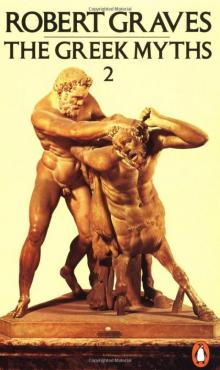 The Greek Myths, Volume2
The Greek Myths, Volume2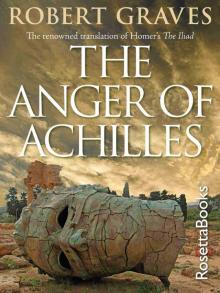 The Anger of Achilles: Homer's Iliad
The Anger of Achilles: Homer's Iliad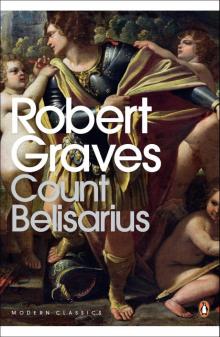 Count Belisarius
Count Belisarius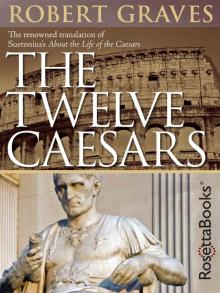 The Twelve Caesars
The Twelve Caesars Complete Poems 3 (Robert Graves Programme)
Complete Poems 3 (Robert Graves Programme) Homer's Daughter
Homer's Daughter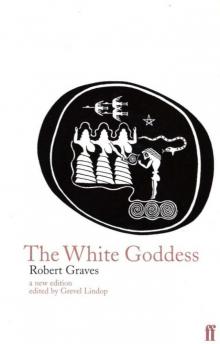 The White Goddess
The White Goddess Goodbye to All That
Goodbye to All That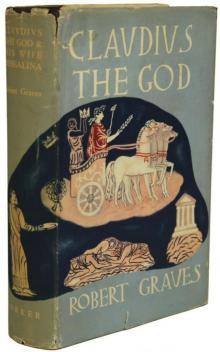 Claudius the God and His Wife Messalina
Claudius the God and His Wife Messalina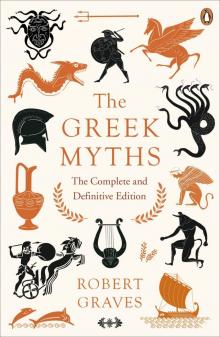 The Greek Myths
The Greek Myths I, Claudius
I, Claudius The Islands of Unwisdom
The Islands of Unwisdom Complete Short Stories
Complete Short Stories The Golden Fleece
The Golden Fleece They Hanged My Saintly Billy
They Hanged My Saintly Billy King Jesus
King Jesus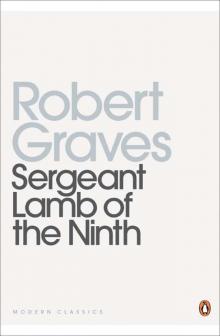 Sergeant Lamb's America
Sergeant Lamb's America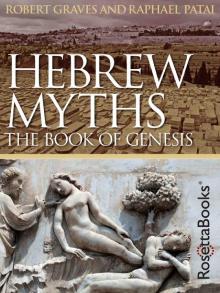 Hebrew Myths: The Book of Genesis
Hebrew Myths: The Book of Genesis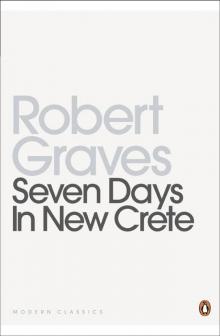 Seven Days in New Crete
Seven Days in New Crete Proceed, Sergeant Lamb
Proceed, Sergeant Lamb Claudius the God
Claudius the God Wife to Mr. Milton
Wife to Mr. Milton The Complete Poems
The Complete Poems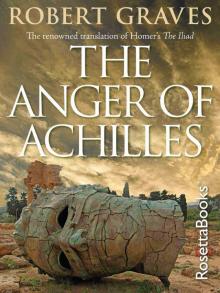 The Anger of Achilles
The Anger of Achilles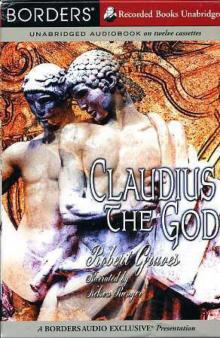 Claudius the God c-2
Claudius the God c-2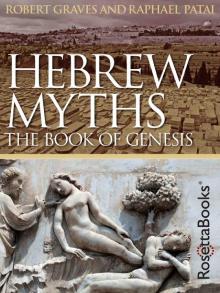 Hebrew Myths
Hebrew Myths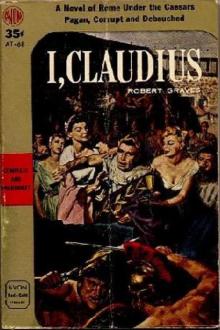 I, Claudius c-1
I, Claudius c-1 The Greek Myths, Volume 1
The Greek Myths, Volume 1